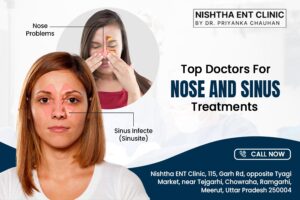When it comes to issues related to hearing, tinnitus, or vertigo, seeking the right medical care is crucial. An ear nose throat specialist is trained to diagnose and treat these conditions, providing relief and improving the quality of life.
An ENT doctor for hearing problems is equipped with the expertise to address a range of issues, from hearing loss to balance disorders. By consulting an ear nose throat specialist, individuals can receive personalized care tailored to their specific needs.
Key Takeaways
- An ear nose throat specialist is crucial for treating hearing, tinnitus, and vertigo problems.
- Seeking specialized care can significantly improve the quality of life.
- ENT doctors are trained to diagnose and treat a range of ear-related conditions.
- Personalized care is available for individuals with specific needs.
- Consulting an ENT doctor can provide relief from hearing and balance disorders.
Understanding the Role of an ENT Specialist
For individuals experiencing auditory problems, knowing what an ENT specialist does can be incredibly beneficial. An ENT specialist, also known as an otolaryngologist, is a medical doctor who specializes in the diagnosis and treatment of disorders related to the ear, nose, and throat.
What is an Otolaryngologist?
An otolaryngologist is a highly trained medical professional with expertise in managing conditions that affect the ear, nose, and throat. They are skilled in both medical and surgical treatments, making them versatile in addressing various ENT-related issues.
Specialized Training and Expertise
ENT specialists undergo rigorous training, including medical school and several years of residency, to gain comprehensive knowledge in otolaryngology. Their expertise extends to treating complex conditions such as hearing loss, tinnitus, and vertigo, making them the go-to professionals for auditory issues.
Common Conditions Treated
ENT specialists treat a wide range of conditions, including hearing impairment, tinnitus, vertigo, and other balance disorders. They are equipped to handle both simple and complex cases, providing personalized care to their patients. As a tinnitus specialist, an ENT doctor can offer various treatment options to alleviate symptoms and improve the quality of life.
By understanding the role of an ENT specialist, individuals can seek the right medical care for their auditory problems, ensuring they receive the best possible treatment.
Common Hearing Problems Requiring ENT Care
Common hearing problems often require professional care from an ENT doctor to prevent further deterioration. Hearing loss and related issues can significantly impact an individual’s quality of life, making timely intervention crucial.
Types of Hearing Loss
Hearing loss can be categorized into three main types: conductive, sensorineural, and mixed. Conductive hearing loss occurs when there’s a problem transferring sound wave anywhere along the route through the outer ear, eardrum, or middle ear. Sensorineural hearing loss involves damage to the inner ear or the auditory nerve. Understanding the type of hearing loss is essential for appropriate treatment.
Symptoms of Hearing Impairment
Symptoms of hearing impairment can vary but often include difficulty hearing conversations, especially in noisy environments, and ringing in the ears (tinnitus). Other signs may be watching TV or listening to music at high volumes and feeling tired from listening.
Impact on Quality of Life
Hearing loss can have a profound impact on an individual’s quality of life, affecting communication, social interactions, and even mental health.
“Hearing loss can lead to feelings of isolation and depression if left untreated.”
Seeking care from anENT doctor for hearingissues can significantly improve one’s quality of life.
Prevalence in India
Hearing loss is a significant health issue in India, with millions affected. According to recent studies, the prevalence of hearing loss in India is substantial, highlighting the need for accessible ENT care. An ENT specialist can provide the necessary care and treatment options.
Visiting an ENT doctor can provide individuals with the care needed to address hearing problems effectively. With various treatment options available, including hearing aids and surgical interventions, there’s hope for improving hearing and quality of life.
Tinnitus: Causes, Symptoms, and Management
Tinnitus is a common condition where individuals perceive sound without an external auditory stimulus. It can manifest as ringing, buzzing, hissing, or other sounds and is a symptom rather than a disease itself.
Understanding Tinnitus
Tinnitus can be temporary or chronic. Temporary tinnitus might result from exposure to loud noise, while chronic tinnitus can be due to various underlying health conditions, including hearing loss, earwax buildup, or certain medications.
Risk Factors and Triggers
Several factors can increase the risk of developing tinnitus, including age-related hearing loss, exposure to loud noises, and certain health conditions like high blood pressure or temporomandibular joint (TMJ) disorders.
When to Seek Medical Attention
If tinnitus is persistent, affects daily life, or is accompanied by other symptoms like dizziness or hearing loss, it’s crucial to consult a tinnitus specialist. Early evaluation can help identify underlying causes and guide appropriate treatment.
Tinnitus Impact Assessment
Assessing the impact of tinnitus involves understanding its effect on daily activities, sleep, and overall well-being. Healthcare professionals may use questionnaires or other tools to gauge the severity and develop a personalized plan, potentially including tinnitus remedies such as sound therapy or counseling.
Vertigo and Balance Disorders
Vertigo, a condition characterized by a spinning sensation, is often associated with balance disorders that can be debilitating. It is essential to understand the nuances of vertigo and how it differs from general dizziness to seek appropriate medical care.
Differentiating Vertigo from Dizziness
While dizziness is a broad term that encompasses a range of sensations, including lightheadedness and unsteadiness, vertigo is specifically characterized by the perception of movement or spinning. This distinction is crucial for diagnosis and treatment.
Common Causes of Vertigo
Vertigo can be caused by various factors, including inner ear problems such as benign paroxysmal positional vertigo (BPPV), vestibular neuritis, and Meniere’s disease. Understanding these causes is vital for effective vertigo treatment.
Associated Symptoms
Symptoms associated with vertigo can include nausea, vomiting, and difficulty walking. In some cases, vertigo can be accompanied by hearing loss or tinnitus, complicating the diagnosis.
Emergency Warning Signs
It’s crucial to recognize emergency warning signs such as sudden severe headache, double vision, or weakness in the limbs, which may indicate a more serious condition requiring immediate medical attention. Knowing when to seek help is key to preventing complications.
Seeking professional help for vertigo and balance disorders can significantly improve quality of life. Effective dizziness treatment and vertigo management strategies are available, offering relief and stability to those affected.
ENT Doctor for Hearing, Tinnitus and Vertigo Problem: Comprehensive Care Approach
Treating hearing loss, tinnitus, and vertigo requires a thorough and integrated care approach. An ENT specialist plays a crucial role in diagnosing and managing these complex conditions.
Multidisciplinary Treatment Methods
ENT doctors employ a variety of treatment methods, including medical, surgical, and rehabilitative approaches. This multidisciplinary strategy ensures that patients receive comprehensive care tailored to their specific needs.
- Medical management of hearing loss and tinnitus
- Surgical interventions for vertigo and hearing disorders
- Rehabilitative therapies to improve quality of life
Personalized Care Plans
Each patient’s condition is unique, requiring a personalized care plan. ENT specialists work closely with patients to understand their symptoms, medical history, and lifestyle to develop an effective treatment strategy.
Integrating Advanced Technology
The use of advanced technology in ENT care has revolutionized the diagnosis and treatment of hearing, tinnitus, and vertigo problems. From sophisticated hearing aids to advanced diagnostic tools, technology plays a vital role in modern ENT practice.
- Hearing aids with AI capabilities
- Advanced diagnostic tests for balance disorders
- Minimally invasive surgical techniques
Indian Approach to ENT Care
ENT care in India is characterized by a blend of traditional and modern practices. Indian ENT specialists are known for their expertise and innovative approaches to treating auditory issues.
What to Expect During Your ENT Visit
When you visit an ENT specialist for hearing loss or other ear-related issues, you’re taking the first step towards a comprehensive diagnosis and treatment plan. Understanding the process can help alleviate anxiety and ensure you’re prepared.
Initial Consultation Process
The initial consultation begins with a thorough medical history review. Your ear nose throat specialist will ask questions about your symptoms, medical history, and lifestyle to understand the root cause of your problem.
Common Examinations
A hearing loss doctor will perform various examinations, including otoscopy to inspect your ear canal and tympanic membrane, and potentially other tests to assess your hearing and balance.
Questions Your Doctor May Ask
Be prepared to answer questions about your symptoms, such as when they started, how long they’ve lasted, and any factors that make them better or worse. As one ENT specialist notes,
“Understanding the patient’s history and symptoms is crucial for an accurate diagnosis.”
Preparing for Your Appointment
To make the most of your visit, come prepared with a list of your symptoms, questions, and any relevant medical records. This will help your ENT specialist provide the best possible care.
By being informed and prepared, you can make your ENT visit a positive step towards resolving your hearing, tinnitus, or vertigo issues.
Diagnostic Procedures for Ear-Related Conditions
ENT specialists employ a range of diagnostic procedures to accurately identify and treat ear-related issues. These diagnostic tools help in understanding the underlying causes of hearing loss, tinnitus, and vertigo, enabling effective treatment plans.
Hearing Tests and Evaluations
Hearing tests are crucial for assessing the type and degree of hearing loss. Common tests include pure-tone audiometry, speech audiometry, and tympanometry. These evaluations help ENT specialists determine the most appropriate treatment, whether it involves hearing aids, assistive devices, or surgical interventions.
Balance Assessment Tests
Balance assessment tests are used to diagnose balance disorders and vertigo. These tests include electronystagmography (ENG) and videonystagmography (VNG), which help assess the vestibular system’s function. Accurate diagnosis through these tests enables targeted treatment for vertigo treatment.
Imaging Studies
Imaging studies such as MRI and CT scans are often used to visualize the inner ear and auditory nerve. These studies help identify structural abnormalities or lesions that may be causing hearing or balance problems. They are particularly useful in diagnosing conditions that require surgical intervention.
Advanced Diagnostic Technologies in India
India has seen significant advancements in diagnostic technologies for ear-related conditions. Many ENT clinics and hospitals are equipped with state-of-the-art equipment, including advanced audiometers and vestibular testing systems. Some centers also offer specialized tests for tinnitus assessment and management, catering to the needs of patients seeking tinnitus specialist care.
Treatment Options for Auditory Issues
Understanding the various treatment options for auditory issues is crucial for individuals seeking to address hearing loss, tinnitus, or vertigo. The right treatment can significantly improve the quality of life for those affected by these conditions.
Hearing Aids and Assistive Devices
Hearing aids are among the most common solutions for hearing loss. These devices amplify sound, making it easier for individuals to communicate. Modern hearing aids are sophisticated, with features like noise reduction and Bluetooth connectivity. Consulting a hearing loss doctor can help determine the most suitable device based on the type and severity of hearing loss.
- Behind-the-ear (BTE) models
- In-the-ear (ITE) models
- Completely-in-canal (CIC) models
Surgical Interventions
In some cases, surgical intervention may be necessary to address the underlying cause of hearing loss or other auditory issues. Procedures such as cochlear implantation or stapes surgery can restore or improve hearing. It’s essential to discuss the potential benefits and risks with an ENT specialist.
Tinnitus Management Strategies
Managing tinnitus often involves a combination of therapies. Tinnitus retraining therapy (TRT) and cognitive behavioral therapy (CBT) are effective in helping patients cope with the condition. Additionally, various tinnitus remedies, including sound therapy devices, can provide relief.
“Tinnitus management is not a one-size-fits-all approach; it requires a personalized strategy to effectively reduce symptoms.” – Dr. [Last Name], ENT Specialist
Vertigo Treatment Approaches
Treatment for vertigo depends on the underlying cause. Options may include canalith repositioning procedures (CRP) for benign paroxysmal positional vertigo (BPPV), medication to alleviate symptoms, or vestibular rehabilitation therapy to improve balance.
Rehabilitation Therapies
Rehabilitation therapies, such as auditory rehabilitation and vestibular therapy, play a crucial role in helping patients adapt to and manage their conditions. These therapies can significantly improve functional abilities and overall well-being.
By exploring these treatment options, individuals can make informed decisions about their care, working closely with healthcare professionals to achieve the best possible outcomes.
Prevention and Self-Care Strategies
Taking proactive steps towards ear health can significantly reduce the risk of hearing, tinnitus, and vertigo problems. By adopting simple preventive measures and making informed lifestyle choices, individuals can protect their auditory well-being.
Protecting Your Hearing
Protecting your hearing involves avoiding exposure to loud noises, wearing ear protection in noisy environments, and keeping the volume low when listening to music through headphones. Regular hearing checks can also help identify potential issues early.
Managing Tinnitus at Home
Managing tinnitus at home can be achieved through relaxation techniques such as meditation and deep breathing exercises. Sound therapy can also be beneficial, using background noise to mask the tinnitus.
Vertigo Prevention Tips
Preventing vertigo involves making certain lifestyle adjustments, such as avoiding sudden head movements and maintaining a healthy diet rich in vitamins and minerals. Staying hydrated is also crucial.
Lifestyle Modifications
Making healthy lifestyle choices, such as exercising regularly and quitting smoking, can significantly impact ear health. A balanced diet and stress management techniques can also contribute to overall well-being.
As an auditory issues specialist would advise, incorporating these strategies into daily life can lead to better ear health and reduced risk of dizziness treatment needs.
Finding the Right ENT Specialist in India
When it comes to addressing hearing, tinnitus, or vertigo issues, choosing the right ENT doctor is crucial for effective treatment. An ENT specialist or otolaryngologist is a medical doctor trained to diagnose and treat disorders related to the ear, nose, and throat.
Qualifications to Look For
To ensure you receive the best care, look for an ENT specialist with the following qualifications:
- MBBS degree from a recognized medical institution
- Postgraduate degree in ENT (MS or DLO)
- Fellowship or additional training in otolaryngology
- Certification from a reputable medical board
Questions to Ask During Consultation
During your initial consultation, ask the following questions to gauge the specialist’s expertise:
- What experience do you have in treating conditions like mine?
- What diagnostic tests do you recommend, and why?
- What treatment options are available, and which do you recommend?
Top ENT Centers Across Major Indian Cities
India has numerous renowned ENT centers across major cities like Delhi, Mumbai, and Bangalore. Some of the top centers include:
- All India Institute of Medical Sciences (AIIMS), Delhi
- Tata Memorial Hospital, Mumbai
- St. John’s Medical College Hospital, Bangalore
Insurance and Cost Considerations
Before finalizing an ENT specialist, consider the following:
- Check if the specialist is covered under your insurance plan
- Inquire about the cost of consultation, diagnostic tests, and treatment
- Understand the payment options and any additional fees
By considering these factors, you can find an ENT doctor for hearing or other ENT-related issues who meets your needs and provides effective care.
Conclusion
Understanding the complexities of hearing, tinnitus, and vertigo problems is crucial in addressing these conditions effectively. An ENT specialist, or otolaryngologist, plays a vital role in diagnosing and treating these issues, offering personalized care plans tailored to individual needs.
For those experiencing tinnitus, consulting a tinnitus specialist can provide relief through various management strategies, including sound therapy and counseling. Similarly, individuals suffering from vertigo can benefit from vertigo treatment approaches that may involve canalith repositioning procedures or vestibular rehabilitation therapy.
By seeking care from an experienced ENT specialist, individuals can regain control over their condition and improve their quality of life. If you’re experiencing symptoms of hearing loss, tinnitus, or vertigo, don’t hesitate to seek professional help. With the right care and support, it’s possible to manage these conditions effectively and enjoy a better tomorrow.
FAQ
What are the common symptoms of hearing impairment that require ENT care?
Common symptoms include difficulty hearing conversations, ringing or buzzing in the ears (tinnitus), feeling like you have earwax or something stuck in your ear, and trouble understanding speech, especially in noisy environments. If you’re experiencing these symptoms, consulting an ENT specialist is advisable.
How is tinnitus managed, and what are the available treatment options?
Tinnitus management involves a range of strategies, including sound therapy, cognitive behavioral therapy (CBT), and relaxation techniques. ENT specialists may also recommend hearing aids or other devices to help alleviate symptoms. The most effective approach often involves a combination of these methods tailored to the individual’s condition.
What causes vertigo, and how is it treated?
Vertigo is often caused by inner ear problems, such as benign paroxysmal positional vertigo (BPPV), Meniere’s disease, or labyrinthitis. Treatment depends on the underlying cause and may include canalith repositioning procedures, medication to alleviate symptoms, or vestibular rehabilitation therapy to help the body adapt to the condition.
What can I expect during my first visit to an ENT specialist?
During your initial consultation, the ENT specialist will typically take a detailed medical history, perform a physical examination, and may conduct or order diagnostic tests such as hearing tests or imaging studies. This helps in understanding your condition and devising an appropriate treatment plan.









1 comment